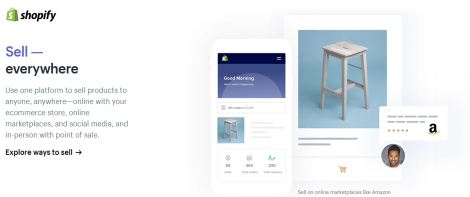Shopify, the Canadian e-commerce giant, has made an important move on logistics, actually entering a frontal competition with Amazon, in a pretty difficult terrain. Last month during the investor day, the company announced a plan to make huge investments across the United States for a network of logistics centers to store, process, ship and deliver packages for its merchants. The goal is to succeed in gaining a greater market share in the e-commerce sector by expanding the value offer for its customers, also consolidating the logistic aspect.

Shopify allows you to manage your store together with presence on the main international marketplaces: with differentiated plans and pricing for all businesses based on the scale and need for modular services
From the announcement the shares on the New York Stock Exchange (NYSE) had a positive reaction, in a long-term trend that has seen a growth always sustained by about a hundred dollars in the listing period to the current 330 USD at the date of this article.

Shopify (NYSE) shares value soared during the last six months. Now they are worth over three hundred dollars, and a good boost came in June with the announcement of investment in e-commerce logistics
One of the important drivers of the choice of Shopify is surely the fact that the merchants are willing to pay interesting figures to have fulfillment services up to the high expectations of the customers, which expects very fast, efficient deliveries and the management of complicated processes such as that of the remains or of the storage.
Amazon, for example, with its fulfillment services has generated over eleven billion dollars in the first quarter of this year, confirming a 20% year-on-year growth, which sees a continuous investment by the Seattle giant on its logistics capacity and on research and development lines that aim to maximize efficiency and open market thresholds with an undeniable competitive advantage, as in the case of air delivery services or drone delivery experiments. A service that has recently been the focus of more in-depth investigations into possible antitrust pressures at least in Italy (while at the European level it seems that the survey focuses on the use of data).

FBA or fulfillment by Amazon, the logistics services of the Seattle giant that allow the seller / merchant to become a Prime account and manage the storage, delivery and management of returns in a tertiary and efficient manner. An efficient service but with an important impact on the profit and loss account of an e-commerce on the marketplace, which generated over 11 billion dollars in turnover for the American company in the first quarter of this year
The Shopify move is not surprising: most companies that use the platform do it to centralize in a unique and efficient service the possibility of serving different platforms. In complete harmony with the need to invest in the direction of new retail, especially in markets that are mature from a digital point of view, such as the United States, China or the European Union, Shopify allows you to serve your customers through the proprietary e-commerce, international marketplaces, and social networks like Facebook or Instagram that implement increasingly effective functions for e-commerce.

Handshake, one of the most interesting acquisitions of Shopify to advance in B2B e-commerce. This American startup has developed a platform to connect professionals and companies in the wholesale products business, an interesting solution to gain important market shares in B2B e-commerce
The Canadian company was founded in 2004, ten years after Amazon’s launch, yet it has come a long way and several industry reports such as Feedvisor have shown that a sizeable 19% share of Amazon sellers has opened shop on Shopify as valid alternative and as a move to serve multiple distribution channels. Shopify is in fact diversifying its services, even going so far as to serve B2B e-commerce which, as is often recalled, has an extremely higher transaction value than B2C but discounting important delays from the point of view of penetration between companies and level of sophistication of the tools available to put it into practice. An important signal are some acquisitions made by the company in this direction: above all the purchase of the American startup Handshake which deals with connecting professional profiles that deal with wholesale trade, creating a real B2B network capable of triggering levers marketers important to producers.
While the logistical battle gets tough … let’s see what happens on the road to new retail!
